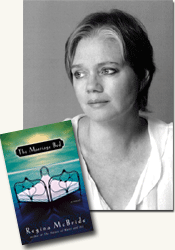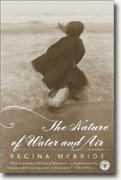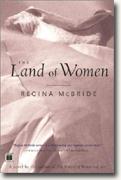 An Interview with
An Interview with
Regina McBride
Interviewer Luan Gaines:Your words speak to me in a manner few authors have, both poetic and visual. I love your images, how the phrases resonate long after I have finished the story. What are your feelings about the power and beauty of language?
Regina McBride: Language has always enchanted me. A beautifully written phrase can give such sensory pleasure and set the imagination on fire. Because I am in love with language, I began my writing life as a poet, but had such an overwhelming urge to tell stories that my poems began to burst their seams; the form could no longer contain what I wanted to write. Lyrically written fiction is for me the best of both worlds.
You mentioned once that "myths have a kind of dreamlike flexibility", almost asking to be "reconfigured and transformed". Can you speak to this concept and how it works in the framing of your novels?
The selkie myth worked very strongly in “framing” my first novel. It is the myth of the elemental mother who, once she finds her seal skin, leaves her human child and goes back to the sea, choosing a darker more original call over a human life with her child. That myth resonated for me in a sad and profound way and from it I began to imagine the story that ultimately became that book.
What I found in writing The Land of Women and The Marriage Bed is not so much that a particular myth “framed” those stories, but that mythic episodes organically broke out here and there as I worked. There is a “land of women” in Celtic lore. My version of it is nothing like the place described in St. Brendan’s journey which is the Celtic version of The Odyssey. And of course there are the ghost lives of the dresses in that book and they have a strong mythic energy.
In The Marriage Bed there is a kind of primitive, magical energy about so much that occurred in Deirdre’s early life on The Great Blasket Island; and there are the alchemical images from the Secretus Seretorum which thread their way throughout the novel.
For many years before I was a novelist I read, or should I say absorbed folklore and mythology. I also read many books by Jung and his followers in which myths and fairy tales are interpreted to show patterns of “individuation” (or the evolution of an individual human psyche). My original interest in Alchemy which figures so strongly in The Marriage Bed, was also sparked by Jung who was fascinated with it. I never read these books with the purpose of somehow making use of them. I read them because I was profoundly drawn to something there; something I could not name at the time. Reflecting on that now it is striking to note that an interest in individuation is an interest in the development of character. In all of my books I am deeply interested in the human journey of the character.
In The Marriage Bed, Deirdre's grandmother takes her away from Great Blasket Island after the tragic death of her parents. Is this exodus for the grandmother's own peace of mind or in Deirdre’s best interests? Both?
I see Deirdre’s grandmother as an exhausted and emotionally broken woman. Still it saddens me that she leaves Deirdre with the nuns.
 What is her grandmother afraid will happen, if Deirdre remains on the island?
What is her grandmother afraid will happen, if Deirdre remains on the island?
Perhaps she feels that Deirdre might be pulled to follow after her parents.
When Deirdre's character is first introduced, she appears weak and fearful. How did her early years as an orphan in the convent of Infants de Marie lead her to this place of submission?
Deirdre looked for ways of disappearing, of deflecting attention away from herself. She was made to speak English and to abandon the Irish language. After the famine the Irish language was associated with shame and degradation. Only certain pockets of people in the west and on the western isles continued to speak it She abandoned the language at the same time that she struggled to erase from her memory, the tragic deaths of her parents.
Nuns and orphanages are common in Ireland and some of the characters in your novels have deep connections to such affiliations, years spent under the tutelage of Catholic nuns. How potent is such an austere background in forming the character of a child?
I was under the auspices of nuns until I was thirteen, not in an orphanage but in a Catholic School. Most of them were benevolent (a few definitely were not). Orphanages figure strongly in these three books because I have struggled to write about devastating breaks between parents and children. The nuns were the surrogate mothers of Catholic Ireland; at least the Catholic Ireland that exists in my books.
Deirdre sees her new family as a Trinity of sorts, her mother-in-law at the apex. At what point does she realize what a dreadful bargain she has made and that "there is a dungeon in Manus' heart?"
I believe she first realizes it on her wedding night. But then she spends those next couple of days alone with Manus and feels hopeful that things will be good from then on in when they leave Kenmare for their own home in Dublin. What a terrible disappointment she feels when she arrives to the house in Dublin and finds that Mrs. O’Breen’s spirit is even more strongly present there than in Kenmare.
In the convent of Infants de Marie, Bairbre O'Breen is at first the focus of Deirdre's intense scrutiny. What is Deirdre searching for in Bairbre? What does this say about Deirdre's need for connection to another?
Bairbre speaks to Deirdre’s imagination. She idealizes her and what she knows of her life. Bairbre is a paradox to Deirdre; she comes from a wealthy family, has an elegant mother and handsome brother. Deirdre knows about the white horses that run on the green hills of their estate on Kenmare Bay. Bairbre comes from all of this and yet she has elected to become a nun. This sets fire to Deirdre’s imagination. The more Deirdre watches her the more mysterious Bairbre seems to her and the more Deirdre is drawn to her.
Mrs. O’Breen draws from the dark tales of the past, family superstitions, to rule her "ecclesiastical family". Can you explain this term?
I first heard this term used to describe the McBrides of Donegal, my father’s ancestors. They were known to be an ecclesiastical family, producing many nuns and priests.
Mrs. O'Breen expects her children to carry on the family legacy, even though she herself leaves the convent to marry. Does she really believe that giving a priest to God will placate Him, or is it the power she enjoys?
She clearly enjoyed the power, but under the surface of everything, she is struggling to sacrifice her own children’s lives in order to keep her pact with her mother who rejected her for having left her own enforced vocation. Mrs. O’Breen’s mother forgave her from her deathbed only after she promised that she would work to inspire vocations in her own children.
 The convent scenes are so realistic that they are strangely comforting and, as a reader, I can imagine the attraction of this life. Had Deirdre not met Manus, could she have found peace in this cloistered life?
The convent scenes are so realistic that they are strangely comforting and, as a reader, I can imagine the attraction of this life. Had Deirdre not met Manus, could she have found peace in this cloistered life?
I am intrigued by your mentioning this. The convent seems to serve in all three books as both prison and protection. In the first two books the protagonists (Clodagh in The Nature of Water and Air, and Fiona in The Land of Women) feel much more constrained by convent life than Deirdre does in The Marriage Bed. It is a kind of safe shell in which Deirdre might actually have been able to make a life which would have included her secret relationship with Bairbre. If Deirdre had stayed, Bairbre too could have had a life in the convent.
Sexual awakening is a powerful and moving theme in each of your novels and you handle it with assuredness. Are such experiences are integral to your protagonists living fully realized lives?
I believe that sexuality is about soul. We see it so degraded in our society; so commercialized; so reduced to cliches. Although I grew up Catholic and the trappings of Catholicism live strongly in my imagination, it is a religion that can not tolerate sexual complexity. Perhaps this makes it even more urgent that these young women who are all, in some ways, ensconced in Catholicism, experience the power and purity of their own sexuality. It is in many ways the true avenue to their souls.
The early romantic days of Manus and Deirdre's marriage, out of Mrs. O'Breen's sight, has all the hallmarks of a classic love story. Did you have a sense of this when you wrote about their short, but intense, days together?
The very real connection between Deirdre and Manus which is experienced so richly in that short, intense time is what Deirdre holds onto through all the years of her marriage. She literally experiences Manus as two people; the Beloved trapped most of the time in the harsher other. In the passionate time early in their marriage, Manus is in a state of rebellion against his mother. This is ultimately what had to happen again later in the book for them to be returned to one another.
 Mrs. O'Breen sees Deirdre as "a kind of empty vessel like the Virgin Mary, who would carry holiness in her womb," orchestrating her son's marriage to the young woman. What is the nature of Manus' betrayal, when, knowing his mother's plans, he marries Deirdre to appease his mother?
Mrs. O'Breen sees Deirdre as "a kind of empty vessel like the Virgin Mary, who would carry holiness in her womb," orchestrating her son's marriage to the young woman. What is the nature of Manus' betrayal, when, knowing his mother's plans, he marries Deirdre to appease his mother?
Jungians might say that Manus is under the spell of the negative mother archetype. He feels very small under the force his mother exerts in his life. He is in many ways crippled by the relationship with his mother. But a double thing is going on here. Yes, he marries Deirdre to appease his mother, but he also has a very strong connection to her. I think he is polarized between the two relationships he has with Deirdre.
Deirdre instinctively resists the truth she abandoned at Great Blasket Island, cautious about telling her story. Finally, drawn back to the source and pregnant with a son who will be heir to the O'Breen legacy, she shares the truth with her daughters. How significant is this act for Deirdre?
It is profoundly significant. Her daughters urge and prod her and, driven by the increasingly desperate circumstances of her life, she surrenders, realizing that there was no where left to go but back to her childhood story. I think she was exhausted with resisting it and she knew she could not become whole until she faced it.
Deirdre's grandmother lies to the nuns and Deirdre doesn't speak about her parent's death for most of her life? Have they committed the "unforgivable sin"?
In the Catholic Church, “despair” is the unforgivable sin.
In The Nature of Water and Air, you combine the gothic with myth; in The Land of Women, you explore exile and memory and the high price of paradise; in The Marriage Bed, the Celtic and the gothic combine in Deirdre's story. How does the rich history of Ireland lend itself to stories built on the myths that so profoundly affect the human who perpetuate them?
Reviewers have often said that there is an element of the gothic in my work. I have never meant to “put” that there. If that feeling or mood is there, it is naturally occurring. The Irish love mystery. If you read the books Lady Gregory put together interviewing Irish peasants about mysterious instances in their lives, they are filled with what might be called occult feeling. The Irish, though a predominantly Catholic country, hold hard to their pagan imaginations.
How deep is your personal connection with Ireland?
Mine is an Ireland of the imagination, a mythic Ireland. My parents were Irish American. Neither had ever been to Ireland. When I was two we left a New York Irish community and moved to New Mexico. I think my parents always felt in exile there. They romanticized the “old country”, feeling nostalgic for a place they had never been. I’m afraid I was afflicted with the same mysterious longing. I did move to Ireland when I was twenty-three and lived there for a year and a half. My time there deeply impressed me. I did not go there to trace relatives; I wanted to find my own Ireland. I do not claim to write about the country in grittily realistic terms. It is more a dream territory of my imagination which has many parallels to the real world; but as reviewers have commented, my books are “otherworldly” “dreamy” and “mythic.”
You are also a poet, which is evident in the beauty of your prose. Has publishing your novels been an easy or difficult endeavor?
It has been a necessary endeavor. The first novel I wrote was never published. It took me five years to write and while I wrote it I was essentially teaching myself to write fiction. It was a very big, unwieldy novel and in the writing of it I unearthed a great deal of my material as a writer. There are bits of all three of my published novels in that first big novel. I always told my students when I was teaching, that everything you write leads you to the next thing. Nothing is wasted. On the tail wind of that first novel I wrote the first draft of The Nature of Water and Air in five months, and it was immediately picked up for publication by an editor I work extremely well with and who I have been fortunate enough to work with on all my novels so far.
Are you working on another novel at this time? If so, can you share something about it with us?
My new novel in progress takes place in pre-Revolutionary Russia. The main character, Vera Sergeyevna Denisova (affectionately known as 'Veroushka'), comes from an eccentric, theatrical family that lives on a crumbling estate outside Petersburg, visited by the luminaries of the Russian theatre.
Vera develops a complicated friendship with Anton Chekhov, and even more particularly, with his fiction, which excites and disturbs her imagination.
After seeing the great Italian actress, Eleanora Duse, in La Dame aux Camelias, Veroushka aspires to act on the Moscow stage, and is taken under the wing of Constantin Stanislavsky and the newly founded Moscow Art Theatre, who attribute their success to Chekhov's plays and the "peculiarities" of his genius.
This novel explores the artistic journey of a gifted actress who draws on unresolved losses from her own childhood in order to bring the characters she plays to life, crossing the permeable borders between fertile imagination and madness.
Do you have any words of wisdom for would-be writers?
Know your obsessions. Write about what excites your passion and your imagination. Go into your work knowing that no idea is set in stone. Don’t try and control your material but be open to revelations; writing a novel should be a journey of discovery. You know that your characters are really alive when they do things that surprise you and they show you that they are more complex and mysterious than you could have predicted. Engage your senses and your emotions in your writing, and believe in the worlds you imagine. Poet and teacher Richard Hugo said, “The imagined world must be at least as real as the actual world and if it’s not, you’re in the wrong business.”
Regina McBride is the author of The Nature of Water and Air and The Land of Women and is the recipient of fellowships from the National Endowment for the Arts and the New York Foundation for the Arts. Her poems have been widely published in literary journals and magazines, and her book of poetry, Yarrow Field, won an American Book Series Award. She grew up in Santa Fe, New Mexico, and lived for a time in Ireland before moving to New York City, where she now resides with her husband and daughter.
Contributing reviewer Luan Gaines interviewed Regina McBride, author of The Marriage Bed (see accompanying review), about her book via email for curledup.com. No part
of this interview may be reproduced without permission. Luan Gaines/2005.




